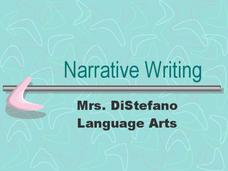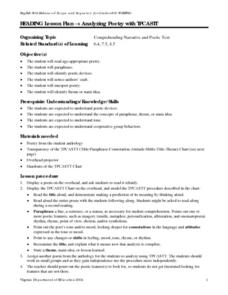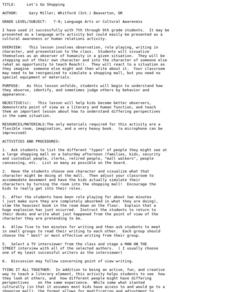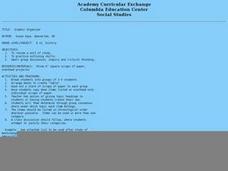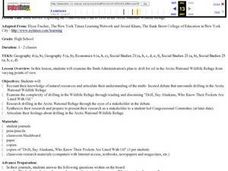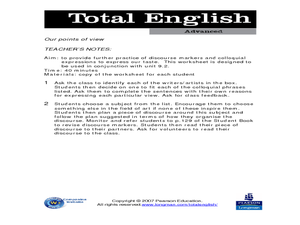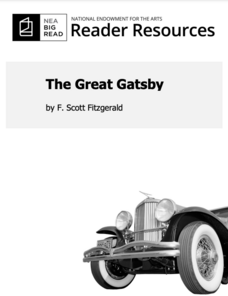Curated OER
Prairie Poetry
Ninth graders take note of the ways in which word choice, rhythm, language and narrative voice, as well as point of view in a poem can be used to evoke a time and place. They use their insights to create a poem of their own.
Tech Coach Corner
Narrative Writing
A comprehensive presentation on narrative writing, this should be shown to a class before the writing process begins. There are not activities listed, so pupils can take notes on the elements of narrative writing and figurative language....
Curated OER
Ubi Est Mantua?
Students chose Latin authors, their birthplace, life and works. They examine pictures of an Italian city and decide which Latin author it could be related to. They answer questions in Latin.
Curated OER
Style and Voice
Develop the writing skills of your high school class. Writers consider their personal style and voice, read selections by other authors, and then write pieces that challenge them to experiment with their own style.
Curated OER
Narrative Nuts and Bolts
After viewing slides and reading about child labor, young authors compose an original narrative story. They practice note-taking skills and work to effectively engage a reader by incorporating plot, logical order, complex characters,...
Curated OER
If You Lived at the Time of the Civil War.
Students investigate major characters of history that are represented in children's literature. They conduct research using a variety of resources and each character is put into a class book as a presentation. The character includes a...
Curated OER
Introduction To Literary Analysis
Explore the fascinating ways in which authors use specific literary devices to create interesting and realistic texts. Using non-fiction articles with the subject of rogue waves, an excerpt from The Perfect Storm, by Sebastian Junger,...
Curated OER
Analyzing Poetry with TPCASTT
Middle schoolers read a poem and complete a TPCASTT chart. They make a prediction about the title (T) , paraphrase each line (P), identify poetic devices and nuances (C-connotation), explore mood and tone (A-attitude), point out shifts...
Curated OER
Let's Go Shopping
Students explore how to become better observers, demonstrate point of view as a literary and human function, and learn an important lesson plan about how to explain differing perspectives in the same situation.
Curated OER
Jack London's The Call of the Wild: "Nature Faker"?
Students examine how Jack London tells a story from the point of view of an animal. They read and discuss primary source documents, analyze text and excerpts, complete a chart, and explore various websites.
Curated OER
Looking and Learning in the Art Museum
Reflect on the art your class can view at a museum. In this art history lesson, students draw six elements of art. They discuss original art versus reproduction artwork and write about their thoughts of a museum. It would be wonderful if...
Curated OER
Express Yourself Lesson Seed 9: Climax
Conduct a close reading of chapter 9 of The Cay. Read the chapter again and ask pupils to respond to a list of included text-dependent questions. Finish the class with the provided writing assignment, which asks learners to use textual...
Curated OER
Literature Review Paragraph
Tenth graders review the structural elements of a literary paragraph and organizational paragraph formats. They author a paragraph examining and reviewing a piece of literature currently being read in class. Students peer-review the...
Curated OER
The American Landscape (1800 - 1850)
Young scholars are introduced to the romantic cultural movement in America. Reading examples of pictures of Washington Irving's home, they identify the characteristics of the movement. They view other paintings of artists from the same...
Curated OER
"A Sound of Thunder" by Ray Bradbury: Questions
These questions are designed to accompany Ray Bradbury's "A Sound of Thunder," and could be used to guide and focus readers or as an assessment of reading skill and knowledge of the elements of a story. Page one focuses on questions of...
Curated OER
Graphic Organizing: Early American History
In collaborative groups, young US historians sort cards (each labeled with a single early American event or issue) according to which of the first four presidents was leading the country at the time. Learners copy the events onto a...
Curated OER
The Importance of Being Flexible and Open-minded as a Visitor to Another Culture: Lesson 2 For "The Train Ride Home"
Students examine the advantages of being flexible when visiting or living in a different culture. They read and discuss a first-hand account by a Peace Corps volunteer in Kazakhstan, and write a letter from the point of view of a...
Curated OER
Using Graphology to Teach Traditional Writing
Introduce your class to the narrative, descriptive and expository forms of writing. In groups, they discuss the personality of the author while graphing the characteristics after reading different examples from the same writer. To end...
Curated OER
Exploring the Controversial Plan to Drill in the Arctic National Wildlife Refuge
Students examine the Bush Administration's plan to drill for oil in the Arctic National Wildlife Refuge from varying points of view. They work in small groups in order to perform their research, but they compose individual journal writes...
Curated OER
Two Sides, Same Coin: How Political Beliefs Influence Language Use
Learners read several magazine articles on the same topic written from different political perspectives, paying particular attention to the diction, syntax, and arguments presented in support the point of view expressed. They then select...
Curated OER
Total English Advanced: Our Points of View
In this discourse markers and colloquial expressions worksheet, students identify the writers and artists in the box and match them to the colloquial phrases listed. Students also choose a subject from the provided list to organize a...
Curated OER
Plant, Point and Record the Life Cycles of Plants
Students examine the life cycle of plants. Individually, they are given a digital camera in which they take pictures of plants in the various stages of the life cycle. To end the lesson, they plant their own flower bed in the classroom...
K12 Reader
Different Perspectives: The American Revolution
Prompt your young historians to hone in their reading comprehension skills by considering the fascinating perspective that Rudyard Kipling offers in his poem, "The American Rebellion", which provides an alternative...
National Endowment for the Arts
Reader Resources: The Great Gatsby by F. Scott Fitzgerald
A handy guide offers high schoolers support as they read the American novel, The Great Gatsby. Complete with a biography of F. Scott Fitzgerald, a timeline of the Roaring Twenties, discussion questions about the novel, and more, this...
Other popular searches
- Authors Point of View
- Author's Point of View
- Author's Point of View Media
- Authors Point of View Media
- Author's "Point of View" Media

